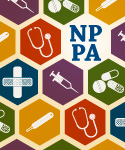January 6th, 2016
Good, Then Fast
Harrison Reed, PA-C
And I hate to hear it. I hate that, as the years go by, it’s a concept that seems to grow in popularity. I hate that the people saying it have been working much longer than me. I should respect them; they should be wiser. I hate what it says about our industry. I hate what it means for our future.
I hate it.
Now this is the part where you tell me that I don’t understand because I am too young, too inexperienced. Of course, I should shy away from fast. I’m the new guy trying to tackle my second specialty in three years. Maybe I’m just rationalizing my own plodding pace. After all, I’m the writer who told you I was fresh off the zebra farm, right?
But I understand the origins of the “better fast than good” mentality. I’ve seen the crowded emergency departments and the packed ICUs. I know how long people wait for a primary care appointment or a specialist referral. I raged at delays while my own mother searched for a diagnosis.
In medicine, time is everything. But at some point we focused more on saving time rather than how we spend it. We became so obsessed with being efficient that we’ve stopped being effective.
No doubt, many areas of the healthcare system are overloaded. But maybe some of that strain is just a symptom of being fast rather than good. Maybe it’s the reason some speed-focused hospitals still keep pneumonia patients days longer than the national average. Maybe it’s the reason people make second and third trips to the emergency department when they don’t understand their diagnosis or treatment plan. Maybe an extra 20 minutes of end-of-life discussion on the oncology ward would have saved a tearful family days in the ICU.
 Of course, like any professional should, I’m getting faster. I’ve got the numbers and the metrics to prove it. And I’m sure someone behind a desk somewhere is pretty pleased with that. But I’m not. For me, speed is a byproduct, a downstream result, a reward for striving to do things the right way each time.
Of course, like any professional should, I’m getting faster. I’ve got the numbers and the metrics to prove it. And I’m sure someone behind a desk somewhere is pretty pleased with that. But I’m not. For me, speed is a byproduct, a downstream result, a reward for striving to do things the right way each time.
That attempt at “good” probably means some of my patients wait a little bit longer than others. And nobody likes that. But at the end of our time together, they rarely seem upset. If they are in a rush, they don’t show it. Some of them even have the time to stop on the way out, turn around, and shake my hand.
And I have the time to stop and shake theirs.
Maybe for some jobs it is better to be fast than good. But I have been a clinician and I have been a patient, and “better fast than good” doesn’t work for me in either case. I guess it’s just a reassuring lie for those who no longer strive for quality.
For the rest of us, it’s better to be good, then fast.

; [/php]/images/AU000_hreed.jpg)

What is essential is to be CLINICALLY GOOD and that takes time to listen to the patient’s history completely, understand what this illness means to him, do a complete physical assessment and know the latest treatments and be able to communicate, in language that the patient understands, what the next steps are. Unfortunately, you are not PAID for the intellectual time this takes nor the telephone calls to the patient after you’ve updated your knowledge. This is why I quit primary care in the US and teach in less developed nations.
It’s true, there seems to be a mismatch between resources/rewards and the “right thing to do.”
Go for good. Fast will get paid more. Also, ordering more tests will get paid more. Also upcoding your work gets paid more. But, you will have more integrity and you will sleep better at night if you go for good.
I’m grateful that even a young, slow, deliberate medical provider is rewarded with a comfortable living. Even without upcoding.
Congratulations to this young clinician for having the cojones to come out and say what’s truthfully right, rather than giving in to the uninformed, unpleasant truths of how medicine is practiced today.
Thank you for your support.
Great post which thoughtfully puts the human face on one of EM’s most difficult aspects.
‘Good / Cheap / Fast – choose any two’ is the management truism.
For a variety of reasons, EM has drifted into a situation where the only aspect of the work we do that is measured reliably is the process timings. So it should not be surprising that that is what is used to judge us, and becomes the driving force in our professional lives. Meanwhile the scope and complexity of our work has increased massively over the last 20 years.
The data we collect is the lens through which we are seen.
However a counter argument is:
The reason our administrators don’t understand quality is because we don’t measure it.
The way we are tackling this in the UK, is for EM to take ownership of our data – a project called the Emergency Care Data Set (ECDS). That way we make sure we capture what we know matters most to our patients and staff – the value added by our treatment.
The only way we can measure value is to consistently measure what comes in (inputs) and what goes out (outputs). Quality, time and cost all matter in value.
Unfortunately this will not stop us being measured by time as to most patients, healthcare is a commodity (until they get misdiagnosed or mistreated) and the 4 hour turnaround standard in the UK has been a good thing for patients and staff and is an easy sell politically.
Measuring value-added will at least be a counterweight to time based metrics that can measure quality (goodness) and will demonstrate just how effective and efficient EM is.
Stay good!
A trusted mentor told me you can not achieve even the most noble pursuits without the data to back it up. A true sentiment, for better or for worse.
Unfortunately, neither the practicing clinicians nor the patients seem to have much say in metric selection these days. And for every well-intentioned measurement, there seems to be five ways to abuse it.
We’ve reached a point in our culture where things and people are treated as a commodity that can be quickly dis-assembled, targeted and optimized. Dr. Reed, it took guts to expose this dangerous mentality in medicine. Thank you.
I think it is not about fast or slow. I think it’s about being efficient. No wasted energy or motion. I remember when I was learning heart surgery and a surgeon told me that I was doing ok but I needed learn to be fast and perfect. I laughed. He didn’t. Then I learned how to be efficient.